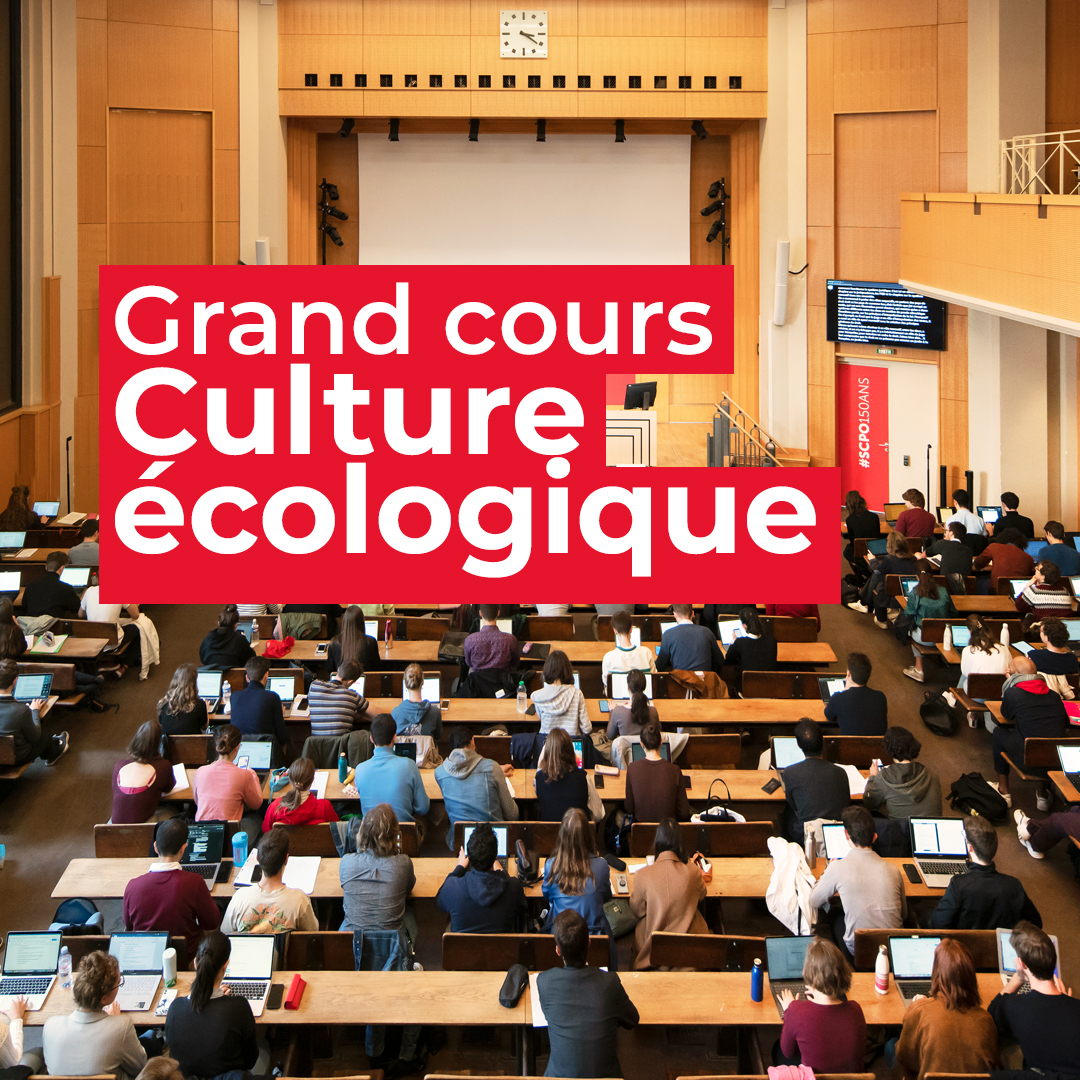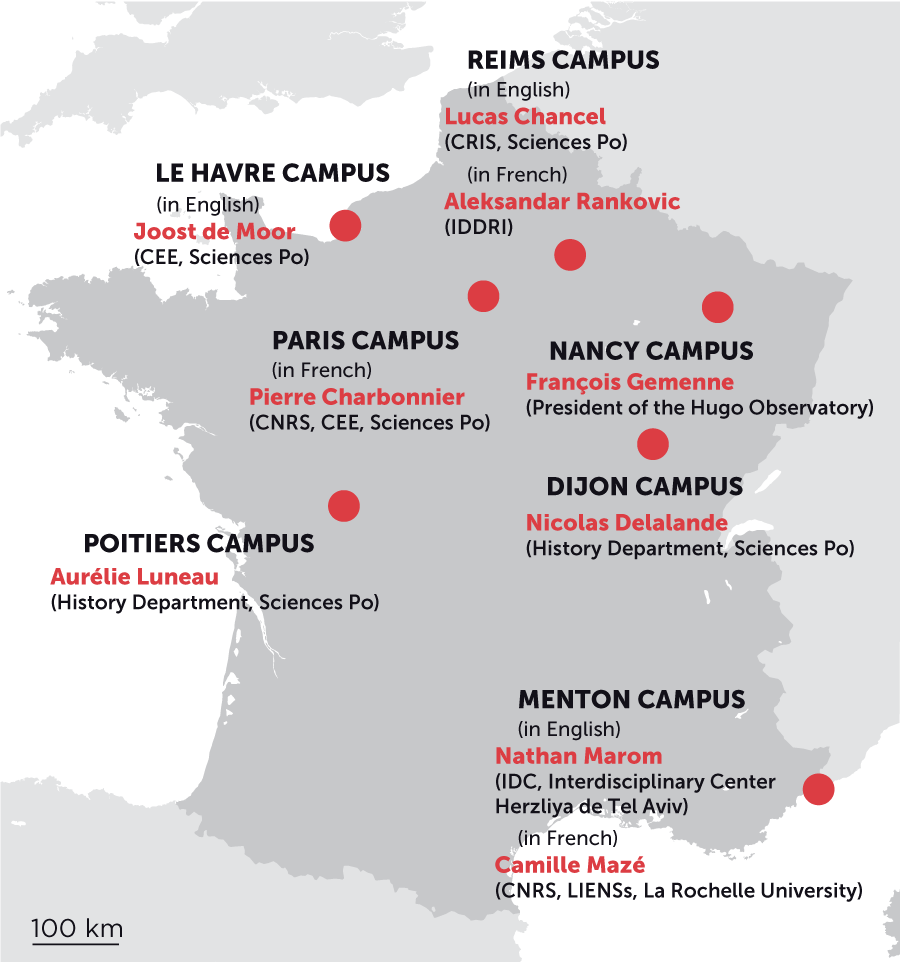Sciences Po launched a compulsory core course on “Ecological Culture”
Paris, January 24th 2023 – Under the leadership of Director Mathias Vicherat, Sciences Po has placed ecological transformation at the core of its teaching and research. Driving this new policy is an ambition to devise practical solutions to contemporary environmental challenges and to meet the expectations of future generations.
“For 150 years, Sciences Po’s aim has been to train enlightened citizens and independent leaders capable of making informed decisions in order to tackle contemporary issues. Ecological transformation constitutes the single greatest challenge facing our societies. For that reason, it has been my intention since taking over the leadership of Sciences Po to implement a compulsory course on the topic for all first-year undergraduate students, which will equip them with a set of preliminary analytical tools for decoding and understanding environmental issues. This is both an ethical and a professional necessity, since it will no longer be possible to hold managerial positions without having studied environmental issues. I want Sciences Po to be at the vanguard of the change, as it always has been throughout its history.” - Mathias Vicherat, Director of Sciences Po
1. A compulsory course on “Ecological Culture” for all first-year undergraduate students as of January 16th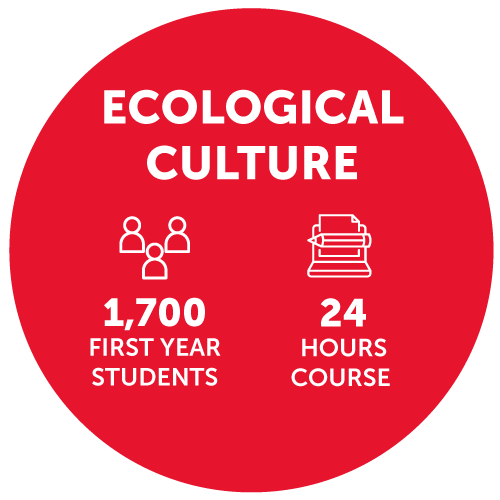
Since January 16th, all 1,700 undergraduates in their first year at Sciences Po are now required to attend a compulsory 24-hour course entitled “Ecological Culture”, led by Pierre Charbonnier. The course provides an introduction to issues relating to ecological transformation.
A graduate of the École Normale Supérieure, Pierre Charbonnier holds an agrégation diploma and a PhD in philosophy. He is a CNRS research fellow based at the Sciences Po Centre for European Studies and Comparative Politics since 2021. As a specialist in the intersection between social science and environmental issues, Charbonnier is particularly interested in examining the adaptation of social protection systems to the economic effects of the climate crisis, and the impact of climate change on international relations.
The new course incorporates all of the core disciplines within Sciences Po’s curriculum, looking specifically at political science, environmental history, law, economics, sociology and international relations, while also shedding light on other scientific fields.
The Ecological Culture course is divided into two parts:
-
18 hours of intensive core lectures in the week from January 16th to 20th.
-
6 hours of additional lectures with academics and engineers specialising in natural and life sciences during the first five weeks of the Spring Semester. Lecturers will address specific environmental issues, linking these to public policy debates.
This is the first time that a single compulsory core course has been taught on all seven Sciences Po campuses (Dijon, Le Havre, Nancy, Menton, Paris, Poitiers and Reims). It was taught in French and English by nine lecturers drawn predominantly from within Sciences Po’s permanent faculty:
- Pierre Charbonnier (CNRS, CEE, Sciences Po) : Paris Campus (French).
- Lucas Chancel (CRIS, Sciences Po) : Reims Campus (English).
- Nicolas Delalande (Centre for History, Sciences Po): Dijon Campus.
- François Gemenne (Director of the Hugo Observatory): Nancy Campus;
- Aurélie Luneau (Centre for History, Sciences Po): Poitiers Campus.
- Nathan Marom (IDC, Interdisciplinary Center Herzliya, Tel Aviv): Menton Campus (English).
- Camille Mazé (CNRS, LIENSs, La Rochelle Université): Menton Campus (French).
- Joost de Moor (CEE, Sciences Po) : Le Havre Campus (English).
- Aleksandar Rankovic (IDDRI) : Reims Campus (French).
2. A redesign and expansion of module options
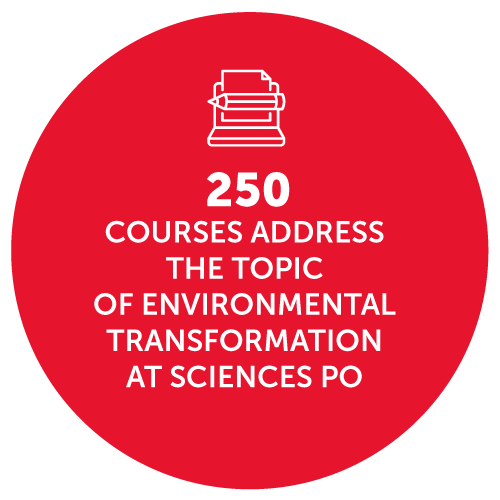
The launch of the Ecological Culture course for first-year undergraduates is part of a coordinated bid to update module options at all stages of the Sciences Po curriculum, in order to foreground challenges relating to ecological transformation.
In total, around 250 courses at Sciences Po address the topic of ecological transformation, from both specific disciplinary and interdisciplinary perspectives. These are joined by several methodology courses looking at specific sources (major enquiries, archives, public reports, legal texts and so on.) and teaching initiatives such as a workshop on climate reporting at the Journalism Schoo, the law clinic on environmental justice issues or group projects at the Urban School.
At Master’s level, Sciences Po has made the notion of impact the centrepiece of the curriculum at its school of management. The Sciences Po School of Management and Innovation has become the School of Management and Impact. Founded in 2016, the school trains more than 1,200 students each year. Its graduates share a desire to use business and entrepreneurship to change society, to reinvent existing models and to build a sustainable world. The school aims to equip them with a more socially and environmentally conscious vision of business, while giving business a role to play in digital and ecological transition.
The academic year 2023-2024 will therefore see the implementation of several major and structural changes to the course offering at the School of Management and Impact:
- Introduction of a range of core courses for first-year Master’s students across programmes looking at corporate environmental and social impact, and at the role of data within business. Social science research will be used to shed light on the links between business, the environment and society.
- Four Master’s programmes will be evolving to incorporate the issue of impact in all its dimensions, while also reflecting a reorientation of the school’s target professional sectors:
- Finance and Strategy
- International Business and Sustainability
- Entrepreneurship, Design and Innovation
- HR & Sustainable Governance
More broadly, each of the School of Management and Impact’s nine Master’s programmes will offer new in-depth courses on specific issues relating to the environment and ecological transition (e.g. impact assessments, carbon accounting, sustainable finance and green bonds, sustainable governance etc.).
Outside of the School of Management and Impact, Sciences Po also offers several specialised programmes at master’s level exploring environmental issues:
- School of Public Affairs: Master’s policy stream on “Energy, Environment and Sustainability”.
- Paris School of International Affairs: Master in Environmental Policy and Master in International Energy.
- Urban School: Master Governing Ecological Transitions in European Cities, launched in September 2021.
Finally, Sciences Po has several dual degree programmes on related themes, for example:
- The Bachelor of Arts and Sciences at undergraduate level:
- On the Reims Campus: dual degree with the University of Reims Champagne-Ardenne in humanities, social science and life science, on the theme of “Environment, Society and Sustainability”.
- On the Paris Campus: dual degree with the Institut de Physique du Globe de Paris, in humanities, social science and Earth science, on the theme of “Politics of the Earth".
- At Master’s level:
- PSIA, School of Public Affairs, School of Management and Impact, Urban School: dual degree with AgroParisTech (Institut des sciences et industries du vivant et de l'environnement)
- PSIA: Dual degree with Sorbonne Université: Environmental Science and Policy
3. With the aim of becoming Europe’s leading university on ecological transformation, Sciences Po is significantly expanding its permanent faculty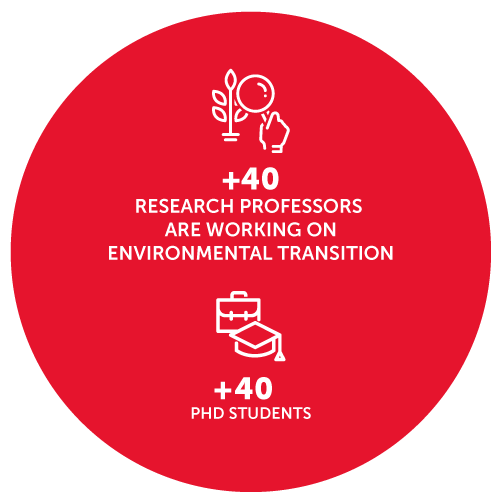
Ecological transformation lies at the heart of Sciences Po’s research strategy, as a world-class research university with internationally recognised expertise in governance and transitional societies.
Over the course of the next five years, numerous academics specialising in environmental issues will be joining the 40 or so faculty members already working in the area. This will make Sciences Po one of the best-staffed research institutions in Europe.
In addition, around 40 of Sciences Po’s PhD candidates are currently writing their theses on issues relating to the environment. This makes ecological transformation one of the most researched subjects at doctoral level.
Bruno Latour’s Legacy
Thanks to funds donated by the late Bruno Latour, a call for proposals has been launched for ten three-year postdoctoral positions for researchers working on ecological transformation.
Latour, who passed away last October, was awarded the 2021 Kyoto Prize for his work on the anthropology of modernity. He decided to donate some of his prize money to establish a fund supporting research in political ecology. Several private partners have also donated to the fund, which has now raised over 2 million euros.
As Sciences Po’s vice director for research, Latour founded the Medialab, a research unit devoted to digital technology, and the applied Master’s in Arts and Politics (SPEAP). Over the course of more than 15 years, he enlightened and enlivened Sciences Po, inspiring generations of students and researchers. It was on the basis of a report he wrote in 2019 that Sciences Po decided to intensify its contribution to ecological transformation and to introduce a compulsory course on Ecological Culture for first-year undergraduate students.
Formed in 2019, the Interdisciplinary Workshop on Environmental Research (AIRE) brings together a collective of researchers, research engineers and doctoral candidates at Sciences Po to analyse various environmental challenges and consider solutions for confronting them. Through its seminars, the AIRE provides a platform for sharing and disseminating environmental research conducted at Sciences Po, fostering dialogue between the human and social sciences and initiating discussions around research approaches and practices within the area.
Following on from the Earth Politics programme introduced by Bruno Latour, in 2019, Sciences Po and Université Paris Cité founded the Earth Politics Centre. The centre’s aim is to create a community of researchers working on crucial intersections between the natural, experimental, human and social sciences, with a view to addressing the complex issues of the Anthropocene.
Sciences Po is relaunching its European Chair for Sustainable Development and Climate Transition, directed since June 2022 by Marc Ringel, a specialist in environmental issues. The Chair’s aim is to provide new insights for all organisations working to advance sustainable development, with a triple focus on the issues of climate transition, economic development and social inclusion. It will promote the design and implementation of national and European public policies advancing the objectives of the UN’s 2030 Agenda and the European Green Deal. Finally, it will bring together a community of researchers and professionals, in France and internationally, to form a firmer interdisciplinary and transnational eco-system.
Finally, Sciences Po was the winner of the ExcellenceS call for projects issued as part of the 4th Investments for the Future Programme, along with its partners the CNRS, Université Paris Cité, INRIA, INED, INSERM, IFREMER, INALCO and IDDRI. The winning project, “Transforming Interdisciplinary Education and Research for Evolving Democraties” (TIERED), began on 2 January 2023. Its aim is to respond to the challenges that ecological transformation presents for democratic systems, which are leading to profound changes within society. An award of approximately 16 million euros will enable the university to enter a new strategic phase in its research, teaching and dissemination of knowledge. The Sciences Po Initiative for Environmental Change was created with the specific aim of supporting this development.
About Sciences Po
Founded around values of openness and excellence, Sciences Po is a selective research university of international standing whose unique model associates a specialization in social sciences and humanities and a multidisciplinarity and a professional anchoring to train actors that can understand and transform society.
PR contacts :
Romain Becker & Camille Kress : media@sciencespo.fr / +33 1 45 49 50 79


